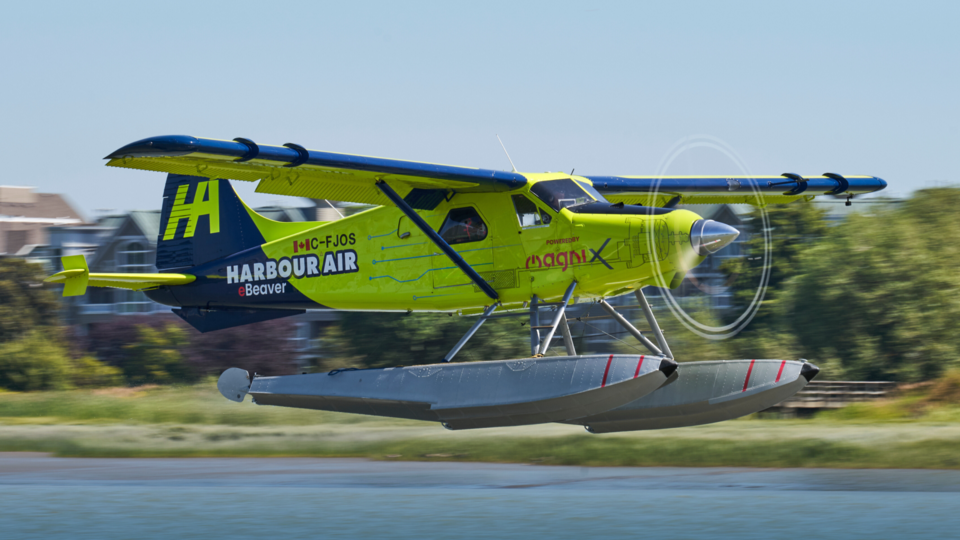A Richmond-based aviation company will demonstrate its all-electric eBeaver at an airshow in Wisconsin this week.
Harbour Air’s first fully electric aircraft is making its international debut at the prestigious EAA AirVenture 2024 airshow in Oshkosh, Wis.
The eBeaver will conduct two flight demonstrations at the airshow, taking place this week.
The first will be a five-minute performance at the airshow on Tuesday, followed by a formation flight on Friday.
Additionally, the company will be featured during Innovation Day on Tuesday, where the plane will be on stationary display to the public.
The event is the largest of its kind, showcasing experimental aircraft and attracting more than 650,000 attendees, enthusiasts and industry leaders from around the world.
The retrofitted DHC-2 de Havilland Beaver is powered by a 750-horsepower all-electric motor from magniX, an electric aircraft engine manufacturer based in Everett, Wash.
For Harbour Air, the benefits of an electric engine include greater efficiency and a significantly reduced carbon footprint compared to a fuel-powered engine.
In a standard seaplane piston engine, 80 per cent of the fuel turns into rejected heat, but for an electric motor only about seven to 12 per cent is lost.
Electric engines also substantially reduce noise pollution and there are no greenhouse gas emissions.
According to Harbour Air specs, the eBeaver will have an extended range compared to a standard Beaver, with a capability of travelling 130 kilometres instead of 82 kilometres.
The eBeaver's endurance will also increase from 60 minutes to 75 minutes and its new engine will produce 750 horsepower compared to 450 horsepower from a fuel-powered one.
However, it will only be capable of carrying up to four passengers instead of six, and a total payload of 425 kilograms instead of 552 kilograms.
Cruising speeds will remain the same, at approximately 233 km/h.
In a media release, Harbour Air CEO Bert van der Stege underscored the opportunity to exhibit Canadian innovation, as well as demonstrate the possibility of a more sustainable future in air transportation.
“We look forward to showcasing our current fully electric aircraft through flight demonstrations, as well as highlighting the advancement of innovative technologies with our engine partner magniX, including via a static eBeaver display at our booth,” he said.
Harbour Air is North America’s largest commercial seaplane airline, and the world’s first to fly a prototype electric aircraft.
With a commitment to building the world’s first all-electric commercial airline, Harbour Air signed a Letter of Intent with magniX for the supply of 50 magni650 engines in early 2024.
The company is currently working on obtaining full certification with government agencies in late 2026/27 as part of its next phase of the electrification of commercial flight.
“Continued electrification of our fleet will be an ongoing process following certification in the months and years to come,” said a Harbour Air spokesperson.
Chief technology officer of magniX Riona Armesmith reaffirmed the company's partnership with Harbour Air, alluding to the doors it opens for sustainability in the industry.
“The eBeaver, powered by magniX’s industry leading electric engines, is a great example of how the aviation industry can decarbonize, without compromise on performance, safety and passenger satisfaction,” she said.
“Showcasing the aircraft with Harbour Air at Oshkosh enables us to further demonstrate the commercial viability and transformative potential of electric flight.”
Harbour Air noted advancing towards sustainable flight and net-zero emissions is critical to reducing greenhouse gases from air travel.
“As local and global economies become more intertwined and air travel increases, we are committed to reduce our fleet's carbon emissions through electrification to support passengers and the industry itself.”
Got an opinion on this story or any others in Richmond? Send us a letter or email your thoughts or story tips to [email protected]. To stay updated on Richmond news, sign up for our daily headline newsletter. Words missing in article? Your adblocker might be preventing hyperlinked text from appearing.




